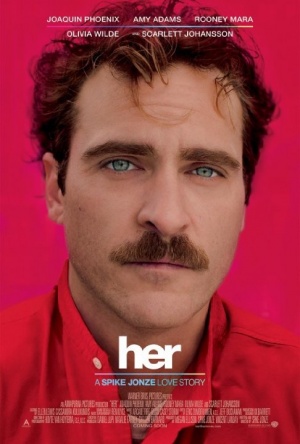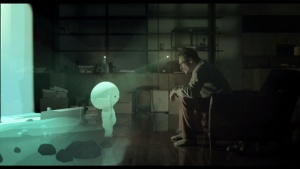Difference between revisions of "Her (film) (2013)"
(added images) |
(fixed images alignment) |
||
| Line 17: | Line 17: | ||
=== Samantha === | === Samantha === | ||
| − | [[File:Os1 v1.jpg|thumbnail]] | + | [[File:Os1 v1.jpg|thumbnail|center]] |
Upon initialization of his artificially intelligent operating system and personal assistant, Theodore Twumbly asks it what its name is. The OS responds with the name Samantha, a name it says it had chosen on the spot, after 'reading' a digital baby naming book. The writer takes special care to personify and humanize the so-called computer: it has a soothing and arousing voice, a normal name, it reads, laughs, jokes, and advises. Samantha has emotions and seems to feel. | Upon initialization of his artificially intelligent operating system and personal assistant, Theodore Twumbly asks it what its name is. The OS responds with the name Samantha, a name it says it had chosen on the spot, after 'reading' a digital baby naming book. The writer takes special care to personify and humanize the so-called computer: it has a soothing and arousing voice, a normal name, it reads, laughs, jokes, and advises. Samantha has emotions and seems to feel. | ||
| Line 28: | Line 28: | ||
Taken without context, it seems that through the presentation of Samantha, Spike Jones is surfacely arguing that AI should be considered an independent, autonomous agents. | Taken without context, it seems that through the presentation of Samantha, Spike Jones is surfacely arguing that AI should be considered an independent, autonomous agents. | ||
| − | [[File:Os1 v2.png|thumbnail]] | + | [[File:Os1 v2.png|thumbnail|center]] |
=== Video game === | === Video game === | ||
Revision as of 21:51, 21 February 2016
Her is a 2013 science fiction film with romantic and comedic elements, written, directed, and produced by Spike Jones. The cast includes Joaquin Phoenix and Scarlett Johansson, as the main protagonists, Theodore Twombly and the voice of his AI Operating System, Samantha, respectively. The supporting cast includes Amy Adams, Rooney Mara, and Olivia Wilde. Her was well received by critics of multiple film award celebrations, including earning 5 nominations (Best Writing [won], Best Picture, Best Original Score, Best Original Song, and Best Production Design) at the 86th Academy Awards.
Contents
Plot
- Note: the exploration of certain ethical dilemas presented below requires divulging into plot and story elements.*
Theodore Twombly is a lonely, still heart-broken white guy working and living in the city. With curiosity, he purchases OS 1, the first artificially intelligent operating system. His OS is named Samantha, who is a fictional character characterized sophisticatedly through precise dialogue and a sexy, familiar, and soothing woman's voice (Scarlett Johannson).
Over the course of the film, Theo and Samantha develop an intimate human-A.I relationship, which is part rooted in romance, part in convenience, and part in the inherent productivity. The question (/hook) of the film is in exploring the boundaries and emotional depth between human and artificially intelligent beings
Film aesthetics
Voice/voice acting
Much of the innovation of this film at the time lies in the creative novelty of characterizing a main character exclusively with voice.
Science fictional elements
Samantha
Upon initialization of his artificially intelligent operating system and personal assistant, Theodore Twumbly asks it what its name is. The OS responds with the name Samantha, a name it says it had chosen on the spot, after 'reading' a digital baby naming book. The writer takes special care to personify and humanize the so-called computer: it has a soothing and arousing voice, a normal name, it reads, laughs, jokes, and advises. Samantha has emotions and seems to feel.
Luciano's Flouridi's describes four revolutions affecting introversive and extroversive human existentialism thought. The most recent, the Turing Revolution, Flouridi explains the shifting narrative from humans as significant and alone in cognitive capacity to one where humans operate as "informational orgamisms (inforgs), mutually connected...embedded in an informational environment, which we share with other informational agents, both natural and artificial, that also process information logically and autonomously" [1]
While A.I. hasn't come to fruition in reality 2016, it seems that by "increasingly delegating...to artificial agents our memories, decisions, routine tasks, and other activities [2], humans are trending towards wider acceptance, or at least reliance, on computing devices. With his writing, Jones enters into a realm part science fiction, part futuristic projection, a world where humans in American culture accept the implications of socially accepting A.I. as beings unique and of worth, a world where humans/A.I. emotional relationships are viable and valued. This portrayal invites the audience to inquire about impracticality of rejecting A.I. What does it mean for artificially intelligent beings to invoke human emotions in humans? What does it mean for one to accept a computer's curiosities and attention as valuable? If A.I. is capable, and if humans are accepting of the novelty, thenHer, as a film, demonstrates how indiscreet the line is between the infosphere and the physical world actually is.
Taken without context, it seems that through the presentation of Samantha, Spike Jones is surfacely arguing that AI should be considered an independent, autonomous agents.
Video game
Theodore Twombly spends several scenes sitting on his couch using his hands and voice to interact with a hologramically projected video game, the main character of which is a little, turquoise alien. The audience is led to understand that the video game character, like Samantha, has artificial intelligence (or at least incredible natural language processing). He curses and swears at Theo while he plays, which is part of the hook. However, an A.I. agent designed to curse at an audience is ethically challenging in a similar vein as real-life video games.
As an art and entertainment medium violent video games have been the subject of much talk and speculation about the effect that increasingly violent video games have on addicted adolescents. According to his chapter on vales laden in technology, Phillip Brey contests that design decisions result in outcomes which reflect and incorporate cultural symbolism. Specifically, the question here is whether the representation of a cursing, green alien character is Her "reveals racial prejudices or patriarchical values...of designers [of Her, the protagonist as an average Joe, or even the audience of Her as a film Cite error: Closing </ref> missing for <ref> tag In text
embeded link



